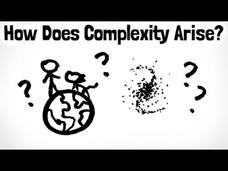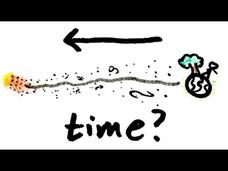Veritasium
What Is NOT Random?
Twelve fundamental particles exist in our universe, and they interact in exactly four ways. Does this mean we should be able to predict the future? We know entropy increases, but how does that impact us? These questions and more become...
MinutePhysics
What Is the Purpose of Life? (Big Picture Ep. 5/5)
In the eyes of a physicist, the purpose of life is to continue the mission of the sun. An engaging lesson discusses the increasing entropy levels of energy that originates at the sun. As life forms use that energy, entropy rises until it...
TED-Ed
What Triggers a Chemical Reaction?
Chemical reactions are happening all around us every second of every day, but what exactly causes these changes to occur? Using easy-to-understand analogies, this video explains how the concepts of enthalpy and entropy determine the ways...
Bozeman Science
Gibbs Free Energy
Energy is neither created nor destroyed, but what about free energy? Where does that fit into thermodynamics? In the video, learners explore simple the spontaneous reaction examples of enthalpy, entropy, and temperature, and then apply...
Be Smart
Why Does Time Go Forward?
Has your class ever wondered why time always progresses in a forward direction and why we cannot travel backward? Learners view this short video segment to explore the concept of entropy and its relevance to time in relation to their...
MinutePhysics
The Arrow of Time feat. Sean Carroll
Time isn't considered a property of physics, but rather a feature. Sean Carroll explains how we remember the past but not the future; yet we still consider time a dimension in physics. The video offers a brief overview of entropy and the...
MinutePhysics
Where Does Complexity Come From? (Big Picture Ep. 3/5)
Mixing milk and coffee is a complex example in the eyes of a quantum physicist. A creative lesson compares a tendency toward entropy with complexity. Learners view a mixture of coffee and milk as first simple, then complex, and finally...
Crash Course
Thermodynamics: Crash Course Physics #23
Teach the basics of thermodynamics with an energizing video. A thorough lesson explains the First and Second Law of Thermodynamics. Scholars learn how these laws apply to isovolumetric, isobaric, isothermal, and adiabatic processes and...
Be Smart
Where Did Life Come From?
Just when you thought you had life figured out ... here comes another great video! Young biologists discover the multi-faceted meaning of life through a video from a comprehensive science playlist. Content includes when life appeared on...
Crash Course
Why We Can't Invent a Perfect Engine: Crash Course Engineering #10
Your car's engine is likely to be only 20 percent thermally efficient. Why so inefficient? Viewers of the 10th video in an engineering series learn how the second law of thermodynamics and entropy limit the efficiency of a car engine....
Crash Course
Thermodynamics: Crash Course History of Science #26
Scientists discovered the first law of thermodynamics 25 years after the second law of thermodynamics. The seemingly obvious discoveries sometimes confuse scientists while more complex challenges encourage extra study—and take more time...
TED-Ed
The Chemistry of Cold Packs
How can it take water hours to freeze, but a cold pack can go from room temperature to near freezing in an matter of moments? Find out with this short video that explores the endothermic reaction that make these modern marvels possible.
Be Smart
The Amazing Science of… DUST?
Why do we bother to dust when more will start to land as soon as we get rid of it? What is dust made of and why won't it ever go away? The video answers these questions and more.
Bozeman Science
Life Requires Free Energy
Free energy, get your free energy here! Learners see that all organisms require free energy, which comes from the sun. The lesson explains the first two laws of thermodynamics and then analyzes metabolism, via glycolysis, on a very...
TED-Ed
At What Moment Are You Dead?
When is a person no longer living? This question has been puzzled over for millennia, but is there a clear answer? Watch as this video examines the biological line separating life and death.
MinutePhysics
Why Doesn't Time Flow Backwards? (Big Picture Ep. 1/5)
Take a ride through time as you learn about the status of the past, present, and future from a physics perspective. The video instructor explains the Big Bang Theory through the equilibrium of time. Learners connect the Second Law of...
Veritasium
This Particle Breaks Time Symmetry
CPT theory is the basis for much of physics, but what happens when researchers disprove the theory piece by piece? Explore the idea with a video about the Nobel Prize-winning breakthroughs that shifted the entire way scientists...
Be Smart
Can We Get Older Without Aging?
There are reasons elderly people are more susceptible to diseases. A video lesson instructor discusses the changes cells endure over someone's lifespan and how that affects the likelihood of contracting a disease.
Curated OER
Carnot Cycle and Carnot Engine
The Carnot Cycle is the focus of this chemistry video. Carnot was a French engineer who proved that energy transfers happen in a cycle. They start and finish at the same pressure, volume, and temperature. A system that completes the...
Curated OER
Work Done by Isothermic Process
Since the temperature of a system is so crucial in its energy transformation, Sal goes into two processes which greatly affect temperature in a system: The Isothermic Process and The Adiabatic Process. He sets up an example, and...
Curated OER
Efficiency of a Carnot Engine
In the world of chemistry, efficiency is defined as: the work a system does, divided by the energy given to that system to complete the work. Sal illustrates this important chemistry concept by drawing a PV graph that shows a Carnot...
Curated OER
Hess's Law and Reaction Enthalpy Change
Sal introduces students to Hess's Law. The law states that the energy change of a process is independent of how we get from one state to another. He sets up a series of reactions, and solves them to illustrate the principles behind...
Curated OER
Enthalpy
Sal introduces students to the term, "enthalpy" in this chemistry video. He defines enthalpy as: the internal energy, plus the pressure times the volume found in a system. He constructs a PV diagram to illustrate this point.
Other popular searches
- Thermodynamics Entropy
- Entropy Enthalpy
- Thermodynamics Entropy
- Absolute Entropy
- Enthalpy and Entropy
- Entropy Experiments
- Enthalpy vs Entropy
- Entropy and Energy
- Labs on Entropy
- Entropy Money
- Positional Entropy
- Undo Entropy
























